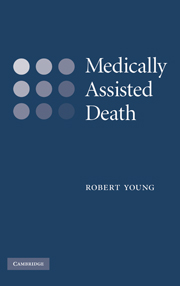Book contents
- Frontmatter
- Contents
- Acknowledgments
- 1 Introduction
- 2 A case for the legalisation of voluntary medically assisted death
- 3 Medical futility
- 4 Physician-assisted suicide
- 5 The sanctity of human life
- 6 Killing versus letting die, the doctrine of double effect, and palliative care for the dying
- 7 Professional integrity and voluntary medically assisted death
- 8 Competence and end-of-life decision making
- 9 Advance directives
- 10 Voluntary medically assisted death and slippery slope arguments
- 11 Non-voluntary euthanasia
- 12 Concluding remarks
- References
- Index of English-language legal cases
- Index of names and subjects
8 - Competence and end-of-life decision making
Published online by Cambridge University Press: 05 June 2012
- Frontmatter
- Contents
- Acknowledgments
- 1 Introduction
- 2 A case for the legalisation of voluntary medically assisted death
- 3 Medical futility
- 4 Physician-assisted suicide
- 5 The sanctity of human life
- 6 Killing versus letting die, the doctrine of double effect, and palliative care for the dying
- 7 Professional integrity and voluntary medically assisted death
- 8 Competence and end-of-life decision making
- 9 Advance directives
- 10 Voluntary medically assisted death and slippery slope arguments
- 11 Non-voluntary euthanasia
- 12 Concluding remarks
- References
- Index of English-language legal cases
- Index of names and subjects
Summary
In many jurisdictions there is a presumption that because competent adults have a right to self-determination their choices should be respected. For that reason, their choices are afforded legal protection against unwanted interference by others as long as they occasion neither harm nor serious offence to others. However, when adults make choices, or signal that they intend to make choices, that raise concerns about their competence, matters are often viewed very differently. Thus, for example, when patients reject the recommendations of those in charge of their health care, their capacity to make decisions about their own health will often be challenged. This is especially apt to be the case in circumstances where life is at stake. In such circumstances some health care professionals are loath to accept a decision as competent unless it can be shown to be rationally justified. As far as these health care professionals are concerned, rejection of medical advice aimed at preserving life is evidence of irrationality. Nevertheless, in jurisdictions where respect is paid to individual self-determination, the law firmly supports a competent patient's right to refuse treatment, even though there is no agreed account of the requirements that have to be satisfied for someone to be regarded as competent. The law does, however, permit doctors to override the decisions of patients deemed not to be competent. This has particular significance for end-of-life care because those opposed to the legalisation of voluntary medically assisted death have often alleged that many who might wish to take advantage of its legalisation lack the necessary competence.
- Type
- Chapter
- Information
- Medically Assisted Death , pp. 137 - 154Publisher: Cambridge University PressPrint publication year: 2007



